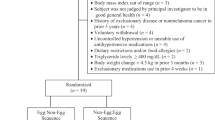Abstract
Objective: To test the hypothesis that a high carbohydrate breakfast with breakfast cereal leads to a meaningful reduction in dietary energy intake from fat, especially from saturated fat, and thus lower serum cholesterol levels.
Design: An open randomized controlled cross-over trial. The subjects were randomized into intervention breakfast cereal or usual breakfast (control) groups.
Setting: Free-living subjects aged 29–71 y in Eastern Finland
Subjects: 224 enrolled, 209 completed the study. The subjects were recruited from a survey of a random population sample and from other sources, and their serum cholesterol was not lower than 5.0 mmol/l. Recruited persons did not have any chronic disease or very low saturated fat intake.
Intervention: The cereal group consumed 80 g (men) or 60 g (women) cereal at breakfast and the control group continued their usual dietary habits for six weeks. After a wash out of six weeks, a cross-over with another six week trial period took place. Measurements (including serum samples and a 3 d food record) took place before and after the two trial periods.
Results: The intervention period led to 2.5 en% (energy percent units) reduction in saturated fatty acids intake. The reduction in total fat intake was 5.5 en%. This was compensated for by increased intake of carbohydrates. The reduction in saturated fatty acids intake led to modest (but in group 1 significant) 0.15 mmol/l (2.5%) reduction in total serum cholesterol level.
Conclusions: The trial showed that regular cereal breakfast can lead to reduced intake of total and saturated fatty acids of the daily diet and consequently to reduction in serum cholesterol level.
Sponsorship: Supported by the Kellogg Company of Great Britain.
This is a preview of subscription content, access via your institution
Access options
Subscribe to this journal
Receive 12 print issues and online access
$259.00 per year
only $21.58 per issue
Buy this article
- Purchase on Springer Link
- Instant access to full article PDF
Prices may be subject to local taxes which are calculated during checkout
Similar content being viewed by others
Author information
Authors and Affiliations
Rights and permissions
About this article
Cite this article
Kleemola, P., Puska, P., Vartiainen, E. et al. The effect of breakfast cereal on diet and serum cholesterol: a randomized trial in North Karelia, Finland. Eur J Clin Nutr 53, 716–721 (1999). https://doi.org/10.1038/sj.ejcn.1600849
Received:
Revised:
Accepted:
Published:
Issue Date:
DOI: https://doi.org/10.1038/sj.ejcn.1600849
Keywords
This article is cited by
-
Breakfast: a multidisciplinary approach
Italian Journal of Pediatrics (2013)


